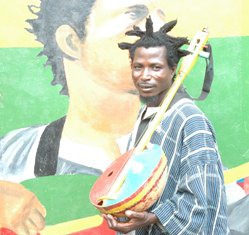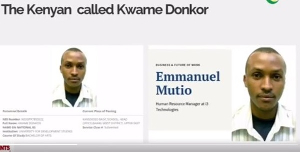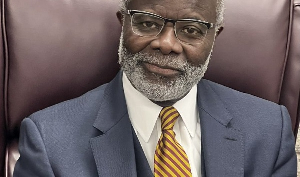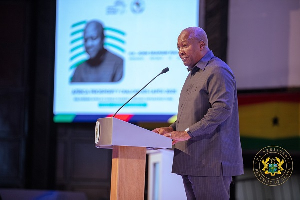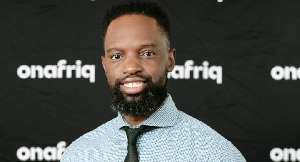The man who sings "I want to see you my father", proclaims his music to be the root of reggae
Ayisoba is a long way from Bongo Suhin in Bolga. His new home sits right in the middle of the capital. Traffic on the Avenor bridge is visible from his backyard and across the street lies old rail tracks that connect a few towns to Accra. Sometimes an overloaded carriage would sluice through the neighborhood and inspire a song on his ‘Kologo’. Life is very different now for Ayisoba, especially after breaking into mainstream radio with ‘My father’.
Mystics up North use kologo rhythms to access the supernatural. The ancient string instrument isn’t something you learn to play -- it is passed on either through birth or by divine possession.
“Kologo is purely spiritual music so it’s very different and it’s taken quite a bit for people to appreciate it on that level because I struggled to get it noticed for a very long time,” he says. “There were times when I got booed because the crowd wasn’t connecting with the music.” Ayisoba worked as a security officer at Dome Hotel during his early days in the city. That was before one guest he recalls as TT introduced him to Terry Bonchaka. Everybody remembers the duo’s phenomenal performances. Then Terry made an unexpected exit that Hiplife is still recovering from. The ‘Pulele’ kid died before he could really get his shine and Ayisoba still holds him close.
“Terry was my best friend -- his death was really hard on me. He struck me as a very unique human being the minute I saw him and he always stood out. I’m yet to meet a Hiplife artiste with the kind of commitment and love for the artform as Terry had.”
A true Kologo artiste is a natural freestylist, and that’s what a lot of the music is about. All the elements of modern contemporary music, be it Hiphop, Jazz and R&B are embodied in this sound the nation is warming up to, plus it’s also wildly spontaneous.
Smoke glided through the sitting area -- forming contorted halos behind Ayisoba’s kinky locks while he narrated how his Kologo got lost in transit after a show in Switzerland.
“That gave me a lot of sleepless nights. My whole world stopped. To make it worse, my father said I should not to return to the village without the Kologo. And I hadn’t even told him the instrument was missing”.
His producer, Panji, recalls feeling different the day the airline managed to locate it. Both of them have since moved on to finish an album of complex rhythms, melodies and contrast vocals that are already crossing borders. King Ayisoba looks like he’s on to something big considering the fact that “I want to see you my father”, is on everybody’s lips not because it’s playing on radio 30 times daily but because people are finally connecting with a new sound. Nobody saw this Kologo mystic coming. Even after his cameo appearance on Kontehene’s ‘Africa Mama’, the spotlight hardly got to his head. Kologo tunes are redefining Ghanaian music all over again and for those taking too long to catch on, the King has a small revelation.
“Kologo music is very similar to reggae. The styles and syllabus of both genres are very similar. Reggae is the next big thing in my village after Kologo and I believe Bob Marley’s roots lie in this music because of the many adaptations of the rhythms throughout his albums. Even the old folks in my village appreciate reggae because of the spirituality of the melody.” Don’t just take Ayisoba’s word for it. Find out and you would discover that the tenor guitar used in early reggae production sounds very much like Kologo tunes. Ayisoba’s album, ‘Modern Ghanaian’, has opened doors for underground musicians who have for the most part struggled for visibility in our payola-structured industry. The album has enough classic cuts to float around for a long time and Ayisoba’s fans will soon find out that ‘My Father’ wouldn’t be their favorite.
His performance at last Saturday’s ‘Miss Malaika’ pageant has already immortalized him in the hearts of the thousands that saw him.





